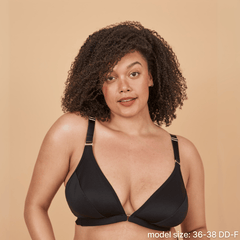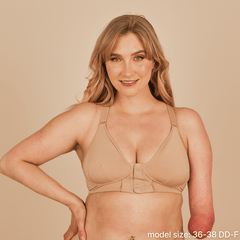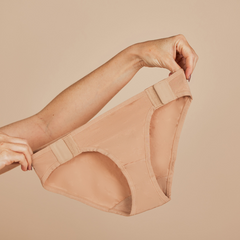
We had people submit their questions about interabled dating to our Resident Sexual Health Clinician, Dr. Kathryn Ellis, OTR/L, OTD, AASECT-SC, an occupational therapist and American Association of Sexuality Educators, Counselors, and Therapists Certified Sexuality Counselor.
What are some tips for someone starting to date someone with a disability or someone who is disabled starting to date somebody who's able-bodied?
As an able-bodied partner:
1. Learn as you go.
You can't expect yourself to get it right on the first date or in the initial phase of the relationship. You’re still getting to know this person just like you would be in any relationship.
Sometimes when we think about topics that we don't talk a lot about, such as disability or sex, we use completely different approaches than we would normally use in everyday life, like learning how to get to know an able bodied coworker or neighbor. On the first date, you’re not expected to know everything about this person, their disability, or about their life living as a disabled person.
2. Follow their lead.
What does this mean? This means, for example, if you see them walking towards the door and reaching out their hand to open the door, then they're probably able to open the door. Not following their lead would be running ahead of them and getting the door for them. Instead, sit back and observe them first.
3. Ask if they need help versus assuming they need help.
People with disabilities can be great self-advocates and they can be very assertive. Something a lot of my clients find frustrating is when help has been provided when it hasn’t been asked for. They share that it can feel very invasive, especially if that help requires physical touch.
For example, let’s say a person living with limb loss falls onto the ground. People with limb loss fall all the time. They know how to fall safely and they know how to get up. So, it can feel invasive if they fall and the next thing they know, five strangers have their hands on them trying to help them stand up. It can also be dangerous to physically handle a person with a disability without their explicit guidance and instructions.
4. Assess if you are spotlighting the disability.
In a dating context, think about ways that you're trying to get to know this person, both about their disability but also in other ways that have nothing to do with their disability. It’s also important to make sure you feel comfortable talking about yourself and your struggles and life experiences versus thinking, “Oh, I'm not going to complain, how can I complain in front of this person?” Sharing builds connection and intimacy.
5. Know you’re going to mess up.
As an able-bodied person, you are privileged. You don't know what it's like to have a disability and live in a world that is set up for able-bodied people. You're going to mess this up. That’s okay, just don't be defensive. Have a quick apology. Listen to your partner when they're upset.
I'll use a personal example here. I was dating somebody with a disability who used humor a lot. He used humor to talk about his disability. As I got to know him and I got more comfortable in the relationships, I started to use humor as well. It was always funny, and the jokes landed. But I remember one time I made a bad joke. It was a bit of a stretch, it didn't land, and ultimately it was hurtful. Even though you can say, “Oh, I was just joking,” that's not very helpful. It’s important to not get defensive, apologize, and learn from your partner. Your intent may be different from the impact it had on your partner.
As a disabled partner:
As the disabled partner, make sure that you're telling your partner what you need and want, and understand that what you need may not necessarily be because you have a disability. Explicit communication is a healthy relationship strategy.
I mentioned that often people with disabilities can be great self-advocates and assertive communicators, but there are also times when this can feel challenging. People with disabilities have shared that they can hesitate to advocate for their sexual wants and preferences.
Consider if this is something you need to work on. Maybe you feel you’re very assertive, but less assertive when discussing sexual health and sexual preferences.

How do you emotionally support someone with a disability?
First and foremost, spend some time self-reflecting on your own attitudes that are based in ableism. That's going to be important because emotionally supporting somebody includes listening to them vent and share what’s frustrating to them. Supportive partners can often confuse support with trying to problem solve ways to fix the problem.
It’s important to understand that historically, people with disabilities have had experiences of people trying to fix their disability. Even in the medical community, the ableism and messaging are there. So, while it's natural to want to problem solve and to fix problems, that may be even more frustrating for somebody with a disability.
That’s why it’s important to check your own bias and spend some time self-reflecting. It can be uncomfortable, because perhaps you've never considered the privilege of living as an able-bodied person until you started dating a person with a disability.
Ask your partner whether they would just like to vent or if they would like help problem solving. They will let you know what would be most beneficial to them in that moment, and then you can focus on supporting your partner how they want to be supported.
How do you build trust? What does a supportive partner look like?
Building trust is creating emotional safety and security. It's about feeling comfortable with vulnerable conversations. This includes being comfortable being called out because you know you’re going to mess up. It’s important to not be defensive when your partner tells you that something that you did was hurtful or harmful.
Again, it’s important to work on yourself. For example, are you somebody that avoids conversations? Are you somebody that’s overly anxious and needs to have difficult conversations immediately?
If so, trying to create a bit of calm around some of the more difficult conversations can make people feel more comfortable being vulnerable and sharing difficult things.
Asking and receiving is also a beautiful dynamic that helps to build trust. Knowing that if I ask for something from my partner and there is a high chance of receiving it builds trust and security. You're not going to receive 100% of the things you ask for but knowing that you can get a high degree of consistency increases trust.



